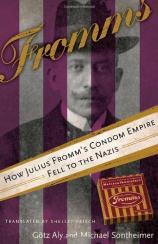Reading Group Guide
Discussion Questions
Fromms: How Julius Fromm

1. The Fromms Act company was so successful that “Fromms” had become the word everyone in Germany used to refer to condoms, comparable to the way “Kleenex” is often used today to refer to tissues. What were the factors contributing to Julius Fromms’s tremendous success in this business?
2. In his attempt to attain German citizenship Julius Fromm stated that he was “devoted to my second homeland, and for me, a return to Russia would be worse than death.” (Page 36) He had such faith in the German people he believed he would be able to return to Germany to recreate his business or receive full restitution after the war. Why do you think his feeling for the German identity was so strong?
3. Julius Fromm chose the architects Arthur Korn and Siegfried Weitzman to design and build his factory. How did the modern vision of these men fit with Fromm’s values and ideas about the ideal conditions both for workers and the creation of his high-quality products? (Pages 53-63)
4. As a businessman above all, Fromm initially ignored the Nazi threat and “even welcomed” (Page 64) as protection having the two directors of his company become members of the Nazi Party. Directors Berthold Viert and Karl Lewis assured their employer, “Herr Fromm, we don’t mean you. You’re an exception.” (Page 65) Why do you think the directors made that choice?
5. By the end of 1937, Fromm finally faced the fact that he would have to leave Germany and sell his business, losing almost everything. This instance of the massive theft of Jewish property involved Hermann Göring, known for his “pleasure in amassing grand manors” and “reveling in historical kitsch.” (Page 81) How do you view his role in the takeover of Fromms Act?
6. How did the British react to the arrival of Jewish immigrants and the Fromms in particular? What aspects of the British behavior during the war does the story of the “Dunera affair” reveal? Were you surprised by this?
7. The heirs of Julius Fromm worked to receive restitution for the large-scale theft of their father’s company. How did the German communists fight against this? As countless Jewish families were affected by the enormous theft by the Nazis, do you believe the pursuit of restitution by any one family can have an important symbolic value?
8. Edgar Fromm, Julius’s youngest son, said, “I felt rather sorry for most Germans after the war. They went along with their holy Führer and paid such a heavy price for having done so.” His sister Ruth also said, “I do not hate the Germans. Even so, I no longer think of myself as German, although I did grow up in Berlin.” (Page 151) What do you think about their feelings about the Germans and being German? How do you imagine you would feel in similar circumstances?
9. The life and career of Max Fromm, Julius’s actor son, was shaped by the war and by his marriage to a French woman. He said toward the end of his life,”When all is said and done, I have accomplished very little.” (Page 149) Nevertheless, do you think during the war he showed some of the strength of character his father exhibited?
10. Raymond Fromm, one of Julius’s grandchildren, states that he knew relatively few details about his forebears’ past, as it was too painful both for his parents to talk about their experiences during the war and for his generation to think about what had happened before they were born. Do you agree with him that it is important and valuable to learn about this past, however traumatic?
Fromms: How Julius Fromm
- Publication Date: October 13, 2009
- Hardcover: 240 pages
- Publisher: Other Press
- ISBN-10: 1590512960
- ISBN-13: 9781590512968







